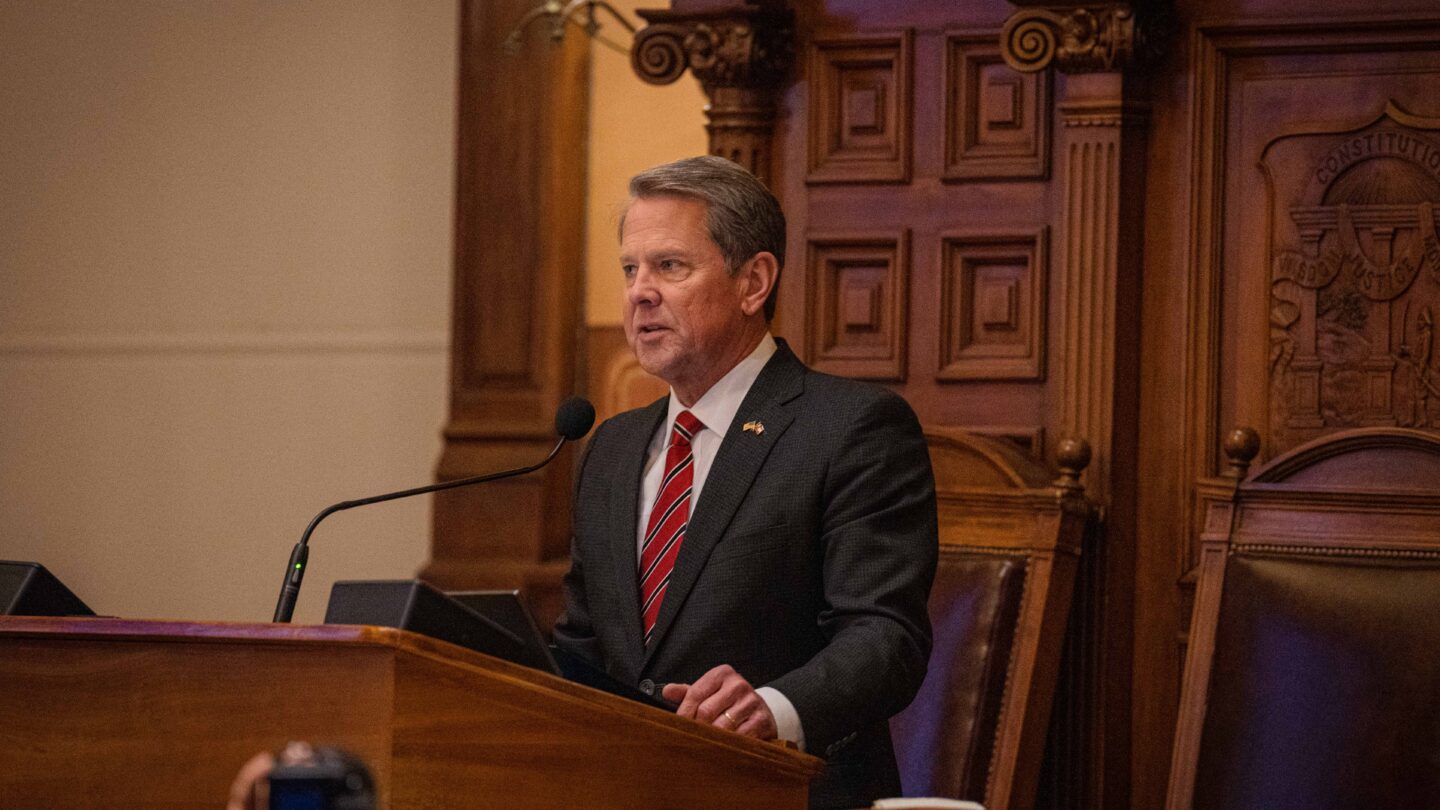This story was provided by WABE content partner Georgia Recorder.
Lawmakers signed off on a $32.4 billion spending plan for next year as the clock expired on the 2023 legislative session, although Gov. Brian Kemp warned of “significant holes” in the budget.
“I think it’s important for me to say tonight that the recent news from the Federal Reserve and others suggest there may be storm clouds on our nation’s economic horizon,” Kemp told members of the Senate on the final day of the session. “Additionally, there are significant holes in this year’s final budget that my office will need to work closely with you all, the House and the Office of Planning and Budget to address in the coming months.
“As we have done in years past, our job is to make the tough decisions necessary to keep the financial health of this state on sound footing, and I believe that there remains work to be done after the session to conclude and achieve that goal,” Kemp said.
As with all bills that pass through the Legislature, the governor has the power of the pen and can veto lines in the budget he finds problematic. The close of the session kicks off the usual 40-day bill signing period, and Kemp has already signed a few bills, including a controversial measure banning most gender-affirming care for minors. Bill signings can be tracked here.
Kemp also pressed senators to sign off on the renewal of a tax break for big economic development projects, threatening to call lawmakers back for a special session if they didn’t. The current perk is set to end this summer.
The Senate gave the measure final approval with a 43-to-6 vote shortly before midnight, extending the tax break to 2026.
“There’s only been 18 of them in the history of Georgia. These are used very selectively,” said Sen. Chuck Hufstetler, a Rome Republican who chairs the Senate Finance Committee and who is the bill’s sponsor. “About 75% of them are outside the Atlanta metro area that have been done. It’s brought in thousands and thousands of jobs.”
Kemp had less luck this year with a push to expand Georgia’s school voucher program. That measure came up short in the House Wednesday in what proved to be one of the more dramatic votes of the 2023 legislative session.
The governor and the state’s lead budget writers framed the process of developing next year’s spending plan as an exercise in restraint in anticipation of a potential economic downturn. Revenues will also be needed to fund future priorities, such as the gradual income tax rate reduction plan passed last year that is set to start in 2024.
State revenues have been on an upswing in recent years, but economists have predicted a slowdown in tax collections and that has caused budget hawks to approach new spending with caution. But rising revenues have also turned up the pressure to boost funding for state services.
“I’d like to note that this is no easy task to balance the revenue at hand with the needs statewide. With more money, we certainly could have done more things, and I would have liked that,” House Appropriations Chairman Matt Hatchett said.
When asked about the governor’s comment about “significant holes” in the budget, House Speaker Jon Burns told reporters there are always some funding plans that come up short. Lawmakers typically address the gaps when they return in January when they amend the budget.
“I think we have a very comprehensive budget, but I’m sure there’s some issues that maybe we could have addressed in different ways that may need to be backfilled some in the future,” Burns told reporters.
The new budget, which will take effect in July, provides a $6,000 pay raise for some state law enforcement and a $2,000 salary bump for teachers and other state employees, and funds the state’s HOPE scholarship at 100%.
The increase for educators is part of a multiyear effort to drive up those salaries and will put the average teacher salary in Georgia to $61,000, according to Hatchett. The budget also includes a $1,000 supplement for school custodians.
The final spending plan softened some of the cuts made in the Senate, but the reductions remained, including a $1.4 million cut to Georgia Public Broadcasting and $66 million cut to the University System of Georgia.
The top legislative budget writers said the Board of Regents has about $500 million in reserves to help absorb the cut, and Senate Appropriations Chair Blake Tillery told senators GPB’s news competitors have long complained about the state subsidy.
“I think that’s actually a very valid point: Why are we picking winners and losers?” Tillery said this session.
Lawmakers also set aside $9.4 million to pay for 500 people to come off the wait list for services for people with intellectual and developmental disabilities. That’s short of the 2,400 a Senate panel recommended last year.
But this year’s budget process also appeared to become tied up with the end-of-session tensions between the House and Senate. Hatchett received a standing ovation when he kicked off his late-night budget presentation with this declaration: “This House does not play politics with the budget.”
Some Democratic priorities – such as $6.3 million for free breakfast and lunch for school children – were also restored after being stripped out in the Senate.
“Kids aren’t able to learn if they’re hungry,” Hatchett said to cheers from some lawmakers. “This funding will provide more than 17 million meals at no cost to low income students in Georgia public schools. Seventeen million meals.”










